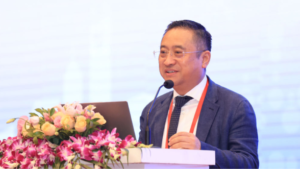![[ Popular Medicine ] Focus on organ transplantation“Quantity and quality” double promotion, bring vitality to patients 1](https://www.transplantation.com.cn/wp-content/uploads/2024/11/image-18.png)
Posted on:2024年11月22日 15:22
Organ transplantation is an important treatment to save the lives of patients with organ failure. Since our country started the pilot of organ donation in 2010, remarkable achievements have been made in system design, social mobilization and standard process, and a sound working system has been established, both the quantity and quality of organ donation and transplantation have been improved. The development report of organ transplantation in China (2021) shows that the organ donation rate per million population in our country is 3.73, which still lags behind the international advanced level.
Sun Yat-sen hospital affiliated to Fudan University is one of the few comprehensive hospitals qualified for heart, liver, kidney and pancreas transplantation in our country. It takes the lead in carrying out many technological innovations in the field of organ transplantation, for example, the country’s first relative kidney transplant for a child with Denys-Drash syndrome, Asia’s first sequential heart-liver-kidney transplant, and Asia’s first combined heart-liver transplant, the world’s first“Relative liver” and“Abandoned” double donor liver transplantation, the world’s first“Abandoned” liver transplantation combined with ALPPS and so on. To further promote the development of organ transplantation in our country, the Asian organ transplantation symposium (TSS) hosted by Zhongshan Hospital opened in Shanghai on November 22.
Chen Zhu, the 13th Vice Chairman of the Standing Committee of the National People’s Congress, was invited to deliver a video speech at the opening ceremony of the Congress, the current chairman of the International Society for Organ Transplantation, John Fung, and the president of the Zhongshan Hospital of Fudan University, Professor Zhou Jian, attended the opening ceremony and delivered speeches. Ke Zhu Tongyu, vice president of the Fudan University Shanghai Medical College and Professor of kidney transplantation at Sun Yat-sen hospital, presided over the opening ceremony.
![[ Popular Medicine ] Focus on organ transplantation“Quantity and quality” double promotion, bring vitality to patients 2 94bb06846425e0ca9ee97cf3cbe046b2_93a24e4d77632a32426b40ddec12fd11_8519.png](https://www.popumed.com/uploads/cms/2024/11/22/94bb06846425e0ca9ee97cf3cbe046b2_93a24e4d77632a32426b40ddec12fd11_8519_20241122152000_857.png)
Academician Chen Zhu’s video address
![[ Popular Medicine ] Focus on organ transplantation“Quantity and quality” double promotion, bring vitality to patients 3 94bb06846425e0ca9ee97cf3cbe046b2_93a24e4d77632a32426b40ddec12fd11_8544.png](https://www.popumed.com/uploads/cms/2024/11/22/94bb06846425e0ca9ee97cf3cbe046b2_93a24e4d77632a32426b40ddec12fd11_8544_20241122152011_889.png)
Address by John Fung, current president of the International Society for Organ Transplantation
![[ Popular Medicine ] Focus on organ transplantation“Quantity and quality” double promotion, bring vitality to patients 4 94bb06846425e0ca9ee97cf3cbe046b2_93a24e4d77632a32426b40ddec12fd11_8570.png](https://www.popumed.com/uploads/cms/2024/11/22/94bb06846425e0ca9ee97cf3cbe046b2_93a24e4d77632a32426b40ddec12fd11_8570_20241122152022_527.png)
Speech by Professor Zhou Jian, President of Zhongshan Hospital, Fudan University
![[ Popular Medicine ] Focus on organ transplantation“Quantity and quality” double promotion, bring vitality to patients 5 94bb06846425e0ca9ee97cf3cbe046b2_93a24e4d77632a32426b40ddec12fd11_8592.png](https://www.popumed.com/uploads/cms/2024/11/22/94bb06846425e0ca9ee97cf3cbe046b2_93a24e4d77632a32426b40ddec12fd11_8592_20241122152032_559.png)
Chaired by Professor Zhu Tongyu, deputy dean of the Fudan University Shanghai Medical College
Zhou Jian, head of Zhongshan’s Hospital, said that while our country had made significant progress in organ transplantation, it still faced a serious shortage of organs. This requires not only further improving the existing organ donation and distribution system to ensure fair, transparent and efficient operation, but also technological innovation. Through the use of advanced medical technology and methods, to a certain extent, can expand the source of organ donors, alleviate the current tense contradiction between supply and demand.
In addition to the shortage of organ sources, patients after transplantation also face the hidden dangers of immunosuppression. Because they must take long-term immunosuppressants, they are less resistant to outside pathogens, more susceptible to infection, and even uncommon“Opportunistic” pathogens can be a serious threat. In response to this problem, professor Zhu Tongyu and his team proposed an innovative diagnosis and treatment model for severe and special infections in organ transplantation, including the development of new diagnostic systems for accurate diagnosis of pathogens, the use of phages to treat refractory bacterial infections after transplantation, and the development of BK virus vaccines to prevent viral infections, in order to significantly improve the quality of life of organ transplant recipients, and further improve their long-term survival rate.
It is reported that since 2018, Professor Zhu Tongyu led the team to launch the first clinical trial of phage therapy in our country, and achieved a clinical improvement rate of 78.3% . During this period, the team also published the first phage therapy case report in our country and the world’s first case set and case paper on phage therapy for covid-19 secondary bacterial infection. In 2022, the team initiated the establishment of the Chinese Phage Research Alliance, and issued the expert consensus and group standards for phage therapy and phage preparation quality standards.
In the keynote speech after the opening ceremony, Shiro Takahara, president of Kansai Region Kidney Transplantation Medical Center and honorary president of the Congress, Mr. Zhang Chongwei, deputy director of China Organ Donation Management Center, Mr. Wan Jun, president of Hong Kong Society for Immunology, transplantation magazine executive editor Carla C. Li Bozhang, former president of the Organ Transplantation Society of Taiwan, China, hundreds of Seoul National University experts and scholars (40% of them international experts) from major countries and regions around the world, including Sangil Min, professor of surgery at Korean General Hospital, gathered here, the key scientific issues such as scientific research innovation, organ injury and repair, clinical immune tolerance and infection after organ transplantation are discussed in depth in order to bring good news to more organ transplant patients.


